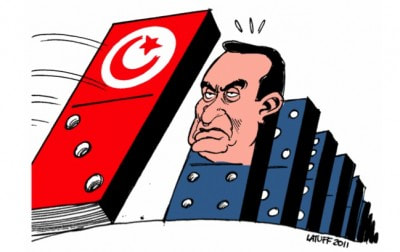AuthorBarbara Petzen As events have unfolded across the Middle East and North Africa, the CHOICES Program at Brown University has rolled out a series of three (so far) compelling lessons that pull together background information, media resources, academic expertise, and suggestions for classroom activities.  The newest of the three lessons, Protests, Revolutions, and Democratic Change, helps students consider the potential effects of the protests on democracy and stability in the Middle East and North Africa. A second unit, After Mubarak: A New Middle East, helps students consider the implications of a leadership change in Egypt on the prospects for democracy throughout the Middle East and North Africa. The initial unit, Egypt’s Uprising, provides students with fundamental information about the causes of the uprising, the role of new media, and the U.S response. Part of the CHOICES Program’s Teaching with the News initiative, these three lessons provide online curriculum materials, video interviews with scholars and policy experts, and ideas to connect the content of the classroom to the headlines in the news. The resources provided encourage context-based discussion of the popular uprisings and democracy movements in the Middle East and North Africa, raising the following questions and more:
RECOMMENDED NEWS RESOURCESThe following news outlets are helpful in keeping up to date with what is happening in the Middle East and North Africa.
Al Jazeera: Region in Turmoil http://english.aljazeera.net/indepth/spotlight/2011/02/2011222121213770475.html Provides an interactive map with summaries of recent demonstrations, as well as in-depth reporting on several countries. The New York Times: Middle East Protests (2010-2011) http://www.nytimes.com/interactive/world/middleeast/middle-east-hub.html Provides a summary of the latest major events in the countries experiencing protests, a compilation of related articles, and a range of multimedia resources. BBC: Mid-East and Arab Unrest http://www.bbc.co.uk/news/world-middle-east-12480844 Provides up-to-date reporting on events in the region, including photos and maps. The Guardian Arab and Middle East Revolt—An Interactive Map http://www.guardian.co.uk/world/interactive/2011/feb/17/arab-world-protests-bahrain-map A country-by-country guide to protests in the region. The Washington Post: Middle East in Turmoil http://www.washingtonpost.com/wp-srv/special/world/middle-east-protests/ Provides a timewww.choices.eduline of major events and additional coverage on the protests. Organized by country. Al Masry Al Youm www.almasryalyoum.com/en An English language edition of an independent Egyptian newspaper and media outlet. Includes videos. This feature was excerpted from materials compiled by the CHOICES program at Brown University (www.choices.edu).
0 Comments
Your comment will be posted after it is approved.
Leave a Reply. |
What We Do |
Middle East Book Award |
© COPYRIGHT 2018. ALL RIGHTS RESERVED.
|
 RSS Feed
RSS Feed
